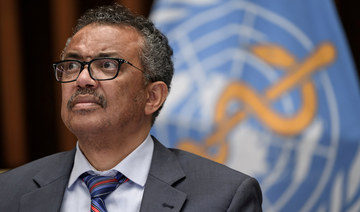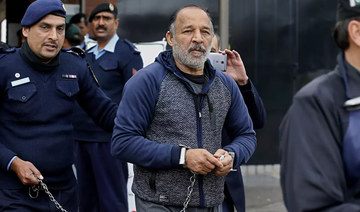WASHINGTON: Spurred on by President Donald Trump’s demand to pull troops out of Germany, the US will bring about 6,400 forces home and shift about 5,600 to other countries in Europe, US defense leaders said Wednesday, detailing a Pentagon plan that will cost billions of dollars and take years to complete.
The decision fulfills Trump’s announced desire to withdraw troops from Germany, largely due to its failure to spend enough on defense. A number of forces will go to Italy, and a major move would shift US European Command and Special Operations Command Europe from Stuttgart, Germany, to Belgium.
Defense Secretary Mark Esper said that some moves will begin in months and will leave about 24,000 troops in Germany. He said that while the decision was “accelerated” by Trump’s orders, the moves also promote larger strategic goals to deter Russia, reassure European allies and shift forces further east into the Black Sea and Baltic regions.
Trump, however, reasserted his very narrow reason Wednesday morning, telling reporters, “we’re reducing the force because they’re not paying their bills. It’s very simple. They’re delinquent.” He added that he might rethink the decision to pull troops out of Germany “if they start paying their bills.”
Esper said the moves will cost in the “single digit” billions of dollars.
The announcement is closely tied to the plan to increase the US troop presence in Poland, a shift long desired by Warsaw and Polish President Andrzej Duda. Officials said the moves will require construction at bases in the US to accommodate the additional forces. They said that in the future other troops would rotate in and out of Europe.
Members of Trump’s own political party have criticized the troop move as a gift to Russia and a threat to US national security. Twenty-two Republicans on the House Armed Services Committee fired back with a letter to Trump saying a reduced US commitment to Europe’s defense would encourage Russian aggression and opportunism.
It’s also unclear if the plan would survive if Trump is not reelected in November.
Germany is a hub for US operations in the Middle East and Africa. The decision to keep nearly half the forces in Europe is a clear move by the Pentagon to assuage allies by avoiding the complete withdrawal of 12,000 troops out of the region. And by spreading forces into the east, it sends a message to Russia that the US is not reducing its commitment to the region and remains ready to protect Eastern Europe from any Moscow aggression.
Sen. Jim Inhofe, the Republican chairman of the Senate Armed Services Committee, has voiced support for the plan while also acknowledging it will take “months to plan and years to execute.” He was briefed on the issue last week, and he issued a statement saying the “concept for realigning US military posture in Europe” is sound.
Trump announced last month that he wanted to cut the number of active duty US troops in Germany from roughly 36,000 to less than 25,000. Shifting forces out of the country had long been rumored and is in line with Pentagon efforts to put more troops in the Indo-Pacific. But Trump’s comments indicated the move was tied more directly to his anger over Germany’s failure to meet NATO defense spending goals.
Trump has branded Germany “delinquent” for failing to meet a NATO goal set in 2014 for members to halt budget cuts and move toward spending at least 2% of gross national product on defense by 2024. And he asserted that the Germans had long shortchanged the United States on trade and defense, declaring that “until they pay” more for their own defense, he will reduce US troops.
At a Rose Garden event last month with Duda, Trump said that some of the troops from Germany would go to Poland and some would go to “other places.”
Under an agreement announced last year, the US already said it was sending about 1,000 more troops to Poland, and progress is being made, officials said, to lay the groundwork for those moves. Based on that agreement, the US will add a division headquarters, a combat training center, an unmanned aircraft squadron and structure to support an Army brigade that could rotate in and out of the country.
Overall, the US has about 47,000 troops and civilian personnel in Germany, spread out across a number of bases, headquarters and smaller installations. Most of the 36,000 on active duty are in a handful of larger Army and Air Force bases including Ramstein Air Base, a hub in the region. There also are 2,600 National Guard and Reserve forces in Germany and almost 12,000 civilians working for the services or the Defense Department.
After Trump’s meeting with Duda, Esper in early July made a rare overseas trip to NATO for a brief visit, seeking to reassure allies that Washington is still committed to the region and that he will consult with them on troops movements. Because of the coronavirus threat, international travel has been significantly limited.
Several NATO defense ministers had expressed concern about the decision to pull thousands of troops out of Germany, particularly since Trump has talked repeatedly about bringing troops home and getting the US out of “endless wars.”
US to bring 6,400 troops home from Germany, move 5,600 more
https://arab.news/y2987
US to bring 6,400 troops home from Germany, move 5,600 more

- The decision fulfills Trump’s announced desire to withdraw troops from Germany, largely due to its failure to spend enough on defense
- Members of Trump’s own political party have criticized the troop move as a gift to Russia and a threat to US national security
UK police officer charged with showing support for Hamas

- Mohammed Adil, from Bradford in northern England, was arrested last November and charged following an investigation
- Adil, a police constable, has been suspended from his job with West Yorkshire Police and is due to appear in court on Thursday
LONDON: A British police officer has been charged with a terrorism offense for allegedly publishing an image in support of Hamas, a group banned in Britain as a terrorist organization, police said on Wednesday.
Mohammed Adil, 26, from Bradford in northern England, was arrested last November and charged following an investigation by British counter-terrorism officers, Counter Terrorism Policing North East said in a statement.
The police watchdog, the Independent Office for Police Conduct (IOPC), said the inquiries had focused on messages shared on WhatsApp which had concluded the case should be referred to prosecutors.
“On Monday, PC Mohammed Adil, 26, was charged with two counts of publishing an image in support of a proscribed organization, specifically Hamas, contrary to section 13 of the Terrorism Act,” the IOPC statement said. “The offenses are alleged to have taken place in October and November 2023.”
Adil, a police constable, has been suspended from his job with West Yorkshire Police and is due to appear before London Westminster Magistrates’ Court on Thursday.
Since the Oct. 7 attacks by Hamas on Israel, police have arrested and charged a number of people at pro-Palestinian protests in London for showing support for the group, while counter-terrorism commanders say they have also had a large amount of online content referred to them.
Family of 7-year-old girl trampled on boat while crossing Channel feared repatriation to Iraq

- Sara Alhashimi was crushed to death when a large group of men rushed onto an overloaded inflatable dinghy she had boarded with her parents and 2 siblings
- Her father says his family was told they were to be deported to his home country of Iraq after living in Europe for 14 years
LONDON: A seven-year-old Iraqi girl was crushed to death in a small, overcrowded boat as her family, who feared repatriation to Iraq after years living in Europe, attempted to cross the English Channel from France to the UK, the Guardian reported on Wednesday.
Sara Alhashimi was with her father Ahmed Alhashimi, mother Nour Al-Saeed, 13-year-old sister Rahaf and 8-year-old brother Hussam when they boarded an inflatable dinghy at Wimereux, south of Calais, last Tuesday.
But Alhashimi, 41, said that as it set sail, a large group of men rushed onboard and he lost his grip on his daughter. Unable to move because of the crush, he could not reach her and she was trampled. Four other people also died.
Alhashimi said he left Basra around 2010 after he was threatened by an armed group. Sara, his youngest child, was born in Belgium. The family had also lived in Sweden and submitted asylum applications to several EU countries but all were rejected. Their attempt to cross the channel last week was their fourth in two months since arriving in the Pas de Calais region, after police prevented the previous crossings.
Alhashimi told the BBC: “If I knew there was a 1 percent chance that I could keep the kids in Belgium or France or Sweden or Finland I would keep them there.
“All I wanted was for my kids to go to school. I didn’t want any assistance. My wife and I can work. I just wanted to protect them and their childhoods and their dignity.”
Smugglers promised a guaranteed place on a boat carrying 40 migrants for €1,500 ($1,600) per adult and €750 per child, Alhashimi said.
Sara was calm, he added, as he held her hand while they walked from a railway station and then hid in dunes overnight while waiting to board their vessel. The smugglers told the group to inflate the boat shortly before 6 a.m., carry it toward the shore and run as they approached the water.
As they did so, however, a teargas canister thrown by police went off beside them, Alhashimi said, and Sara began to scream. He had been carrying her on his shoulders but once inside the dinghy he put her down so he could help daughter Rahaf get onboard.
As he tried to reach Sara in the increasingly overcrowded boat, Alhashimi said he begged a Sudanese man, who had joined them at the last minute, to get out of the way. He even punched the man, with little effect.
“I just wanted him to move so I could pull my baby up,” he said. “That time was like death itself … We saw people dying. I saw how those men were behaving. They didn’t care who they were stepping on — a child, or someone’s head, young or old. People started to suffocate.
“I could not protect her. I will never forgive myself. But the sea was the only choice I had.”
Alhashimi said was only able to reach Sara after French rescuers had arrived at the boat and removed some of the 112 people onboard.
“I saw her head in the corner of the boat,” he said. “She was all blue. She was dead when we pulled her out. She wasn’t breathing.”
Belgium recently rejected an asylum claim by the family on the grounds that Basra was a safe place for them to return to. They had spent the past seven years living with a friend in Sweden.
“Everything that happened was against my will,” said Alhashimi. “I ran out of options. People blame me and say, ‘how could I risk my daughters?’ But I’ve spent 14 years in Europe and have been rejected.”
Colombia to cut diplomatic ties with Israel

- “Tomorrow (Thursday) diplomatic relations with the state of Israel will be severed... for having a genocidal president,” Petro told a May Day rally in Bogota
- Petro, Colombia’s first leftist president, has also asserted that “democratic peoples cannot allow Nazism to reestablish itself in international politics“
BOGOTA: Colombian President Gustavo Petro said Wednesday his country will sever diplomatic ties with Israel, whose leader he described as “genocidal” over its war in Gaza.
“Tomorrow (Thursday) diplomatic relations with the state of Israel will be severed... for having a genocidal president,” Petro, a harsh critic of the devastating war against Hamas, told a May Day rally in Bogota.
Petro has taken a critical stance on the Gaza assault that followed an unprecedented Hamas attack on southern Israel on October 7 — which resulted in the deaths of some 1,170 people, mostly civilians, according to Israeli figures.
In October, just days after the start of the war, Israel said it was “halting security exports” to Colombia after Petro accused Israeli Defense Minister Yoav Gallant of using language about the people of Gaza similar to what the “Nazis said of the Jews.”
Petro, Colombia’s first leftist president, has also asserted that “democratic peoples cannot allow Nazism to reestablish itself in international politics.”
In February, Petro suspended Israeli weapons purchases after dozens of people died in a scramble for food aid in the war-torn Palestinian territory — an event he said “is called genocide and recalls the Holocaust.”
In the October attack, Hamas militants also took about 250 hostages, 129 of whom remain in Gaza, including 34 Israel says are presumed dead.
Israel’s retaliatory offensive has killed at least 34,568 people in Gaza, mostly women and children, according to the health ministry in the Hamas-run territory.
UK auction house removes Egyptian skulls from sale after outcry

- Lawmaker condemns trade as ‘gross violation of human dignity’
- Items were part of collection owned by English archaeologist Augustus Pitt Rivers
LONDON: A UK auction house has removed 18 ancient Egyptian human skulls from sale amid condemnation by a member of Parliament, The Guardian reported.
Labour MP Bell Ribeiro-Addy said the sale of human remains for any purpose should be outlawed and described the trade as a “gross violation of human dignity.”
Semley Auctioneers in Dorset had listed the skulls with a guide price of £200-£300 ($250-$374) for each lot. The collection included 10 male skulls, five female and three of an uncertain sex.
Some of the skulls were listed as coming from Thebes and dating back to 1550 B.C.
They were originally collected by Augustus Henry Lane Fox Pitt Rivers, an English soldier and archaeologist who established the Pitt Rivers Museum in Oxford, which contains about 22,000 items.
After being housed at a separate private museum on his estate, the skulls were sold as part of a larger collection to his grandson, George Pitt Rivers, who was interned during the Second World War for supporting fascist leader Oswald Mosley.
Ribeiro-Addy said: “This despicable trade perpetuates a dark legacy of exploitation, colonialism and dehumanization. It is a gross violation of human dignity and an affront to the memory of those whose lives were unjustly taken, or whose final resting places were desecrated.
“We cannot allow profit to be made from the exploits of those who often hoped to find evidence for their racist ideology. It is imperative that we take decisive action to end such practices and ensure that the remains of those who were stolen from their homelands are respectfully repatriated.”
Britain has strict guidelines on the storage and treatment of human remains, but their sale is permitted provided they are obtained legally.
Saleroom, an online auction site, removed the skulls from sale after being contacted by The Guardian. Its website states that human remains are prohibited from sale.
A spokesperson said: “These items are legal for sale in the UK and are of archaeological and anthropological interest.
“However, after discussion with the auctioneer we have removed the items while we consider our position and wording of our policy.”
Prof. Dan Hicks, Pitt Rivers Museum’s curator of world archaeology, said: “This sale from a legacy colonial collection that was sold off in the last century shines a light on ethical standards in the art and antiquities market.
“I hope that this will inspire a new national conversation about the legality of selling human remains.”
Some of the skulls in the auction had been marked with phrenological measurements by the original collector, he said.
“The measurements of heads in order to try to define human types or racial type was something that Pitt Rivers was continuing to do with archaeological human remains in order to try to add to his interpretations of the past.”
UK students launch fresh wave of pro-Palestine protests

- Activists plan rallies and encampments on campuses across the country
- They aim to persuade universities to divest from arms companies supplying weapons to Israel
LONDON: Students in the UK are launching a fresh round of demonstrations against the war in Gaza.
The latest protests were expected to begin on Wednesday on the campuses of at least six British universities, including Sheffield, Bristol, Leeds and Newcastle, The Guardian newspaper reported. They come at a time when authorities in the US are violently cracking down on similar demonstrations.
The British students are demanding that their universities divest from arms companies that supply weapons to Israel, and in some cases that they sever all academic ties with Israeli institutions.
In Britain, regular mass public marches in London and other cities have attracted most of the attention surrounding the pro-Palestinian protest movement, with little attention so far paid to demonstrations at universities.
However, recent events in the US, including massive protests at Columbia University in New York, have encouraged student demonstrators in Britain to ramp up their efforts.
A coalition of “staff, students and alumni” at Sheffield and Sheffield Hallam universities have established an encampment in solidarity with the Palestinian people, as part of a group calling itself the Sheffield Campus Coalition for Palestine. This week, students are expected to stage walkouts from lectures and take part in a demonstration in Sheffield.
Similar activities are expected in Newcastle, organized by a group called Newcastle Apartheid off Campus. More than 40 students at the city’s university reportedly have set up an encampment on campus and planned to stage a rally on Wednesday. Organizers said students are protesting against Newcastle University’s partnership with defense firm Leonardo SpA, which produces the laser guidance system for the F-35 jets that have been used by the Israeli military in Gaza.
They added: “Although the student union has passed motions with 95 percent of people in favor of calling for the university to end its ties with Leonardo, and multiple ‘Leonardo off Campus’ protests on its campus, it is clear that the university has not listened to students’ concerns.”
Students in Leeds and Bristol are involved in similar activities, including rallies and encampments.
A spokesperson for Universities UK, which represents 142 academic institutions, said: “Universities are monitoring the latest news on campus protests in the US and Canada.
“As with any high-profile issue, universities work hard to strike the right balance between ensuring the safety of all students and staff, including preventing harassment, and supporting lawful free speech on campus. We continue to meet regularly to discuss the latest position with university leaders.”





















